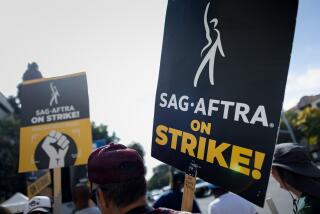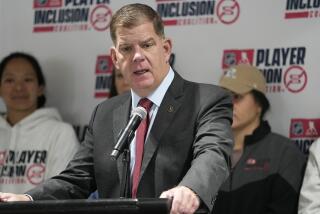A Late Bid to Break the Ice
About a dozen influential owners, general managers, players and agents held “serious” discussions Sunday to shape a new labor agreement and save the NHL season but were losing a battle with the clock, a source familiar with the talks said.
The source said the group, whose members he declined to identify, hoped to “construct a framework they can present jointly to the players’ association and the league in hope it can get them to sit down and put something together.” However, the source said, “they might just find time ran out.”
Commissioner Gary Bettman said last week an agreement would have to be on paper by Sunday night or the season would be canceled. No deal had been documented or was being documented as midnight passed in New York, a league spokesman said. The NHL is expected to announce Tuesday it will cancel the season, the first major professional sports league in North America to lose an entire season to labor strife.
“We will meet internally Monday to discuss next steps,” Bill Daly, the NHL’s chief legal officer, said via e-mail Sunday night.
Also Sunday, at about the time the NHL All-Star game was to have been played in Atlanta, two league and two union executives met in Washington at the invitation of the acting head of the Federal Mediation and Conciliation Service, Scot B. Beckenbaugh. The 5-hour 15-minute session, the third meeting with the FMCS since owners locked out players Sept. 15, produced no advances, both sides said. Daly said negotiators did not talk afterward.
Said Ted Saskin, senior director of the NHL Players’ Assn.: “There was no progress to report as a result of this meeting, and in fairness to the process it would serve no purpose to comment further.”
The league was represented by Daly and outside counsel Bob Batterman. The NHLPA was represented by Saskin and outside counsel John McCambridge. Bettman and NHLPA Executive Director Bob Goodenow did not participate.
The FMCS, an independent agency of the U.S. government, mediates labor-management disputes in industry, government agencies and communities. It assisted the U.S. Soccer Federation last month in reaching an agreement with the soccer players’ union to play in a World Cup qualifier against Trinidad and Tobago and avert using replacement players.
Several sources verified that the mediation produced no reason to believe even a 28-game NHL season will be played. They all painted a picture of intense discussions among players, between players and owners, and between players and agents as they tried to determine what happens next.
One source said a large contingent of players held a conference call early last week and that Dallas Star forward Bill Guerin, a union vice president and member of its negotiating committee, grew “agitated.” Guerin accused other players of caving under owners’ pressure to accept a salary cap and said they could have reached a similar deal in September -- and then hung up.
Another source said a group of players, frustrated with the stalemate, had called Goodenow on Saturday to express concern about losing the season. “They tried to speak with Bob and say, ‘This isn’t the road we want to go down,’ ” the source said.
Goodenow apparently was unmoved.
Owners and general managers have been allowed to speak to the media and to players since last week, when Bettman lifted a gag order prohibiting contact. Steve Rucchin, one of the Mighty Ducks’ union representatives, said he doubted those conversations would be fruitful.
“I think this has been used to put a little pressure on players to get something done,” he said. “I don’t see it leading to anything.
“Still, it is something, and no question, the players are hoping to get something done. Where it stands right now, there has been nothing put forth that is acceptable. Obviously not playing hockey is not a good thing. But that doesn’t mean we accept anything they throw our way. We trust in our negotiating committee.”
The NHL’s last offer, on Wednesday, was to adopt a system the union proposed in December based on a 24% salary rollback, decrease in entry-level salaries and a luxury tax that began at 20% and hit 60% for payrolls that exceeded $45 million. However, the NHL attached four “trigger points” and stipulated that when any point was hit, the system would switch to an NHL plan that pegged salaries at 53% to 55% of revenues and capped payrolls at $42 million.
The union said at least one point would be hit immediately, giving it no incentive to accept the proposal. Daly said he was open to negotiating the trigger points, but Saskin said the other features were too punitive.
Players also were said to be willing to accept a salary cap that’s not linked to revenues, if it’s accompanied by revenue sharing and a luxury tax. That probably wouldn’t satisfy the NHL’s frequently stated need for cost certainty.
More to Read
Go beyond the scoreboard
Get the latest on L.A.'s teams in the daily Sports Report newsletter.
You may occasionally receive promotional content from the Los Angeles Times.








